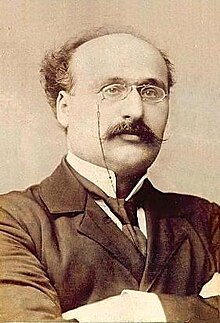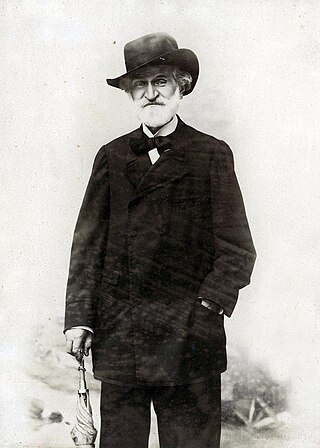
Paolino Vassallo (born 24 July 1856 in Cospicua - deceased 20 January 1923 in Valletta) was a Maltese composer. [1]

Paolino Vassallo (born 24 July 1856 in Cospicua - deceased 20 January 1923 in Valletta) was a Maltese composer. [1]
Paolino Vassallo was the son of Salvatore Vassallo and Victoria Xicluna. At the age of 19, he moved to Paris to study at the Conservatoire Royal with Massenet and Guiraud. He performed as first violin, and later conductor, of the Opéra-Comique. [2]
He founded his Musical Institute in Valletta in 1885 [1] and was appointed the maestro di cappella at Mdina Cathedral in 1902. He wrote three operas; Amor Fatale, Frazir and Edith Cavell. [3] He refused the Grand Prix de Rome to keep his British nationality, and returned to Malta in 1888; here, he met his wife Marianna. In 1905, he was appointed Maestro di cappella of the Mdina Cathedral and the Co-Catheral of St. John in Valletta. During this position he enforced the application of the Motu Proprio decreed in 1910. [2]
Vassallo wrote four operas, of which one (Amor Fatal, 1898) was based on an earlier one (Francesca da Rimini, 1888). His most famous work for the stage is arguably Edith Cavell, a melodrama in three acts to a libretto by poet Alfonso Giglio. It received its première at the Teatru Rjal (Valletta, Malta) on 21 March 1927, four years after Vassallo's death, and was an immediate sensational triumph. [4]
Vassallo died on 30 January 1923. [4] He was featured on a Maltese postage stamp in 2006. There is also a school, Paolino Vassallo Upper Lyceum, and a square, the Pjazza Paolino Vassallo (in Bormla), named after him. In 2007, the National Orchestra of Malta released a live CD of Vassallo's orchestral works. [5]

Pietro Alessandro Gaspare Scarlatti was an Italian Baroque composer, known especially for his operas and chamber cantatas. He is considered the most important representative of the Neapolitan school of opera.

Robert Eugene Ward was an American composer who is best remembered for his opera The Crucible (1961) after the 1953 play of the same name by Arthur Miller. He was awarded the Pulitzer Prize for Music for that opera in 1962.

Johann(es) Simon Mayr, also known in Italian as Giovanni Simone Mayr or Simone Mayr, was a German composer. His music reflects the transition from the Classical to the Romantic musical era. In 1805 he founded the Bergamo Conservatory. He was an early inspiration to Rossini and taught and advocated for Donizetti.

The Messa per Rossini is a Requiem Mass composed to commemorate the first anniversary of Gioachino Rossini's death. It was a collaboration among 13 Italian composers, initiated by Giuseppe Verdi. The composition was intended to be performed on 13 November 1869 in the Basilica of San Petronio, Bologna, where Rossini grew up and spent a large part of his life.

Riccardo Zandonai was an Italian composer and conductor.

Gianluigi Gelmetti OMRI, was an Italian-Monégasque conductor and composer.

Maestro Chev. Carmelo Pace was a Maltese composer, and a professor of music theory and harmony. Born in Valletta, Malta on August 17, 1906, Pace was the eldest of three children. His parents were Anthony Pace and Maria Carmela née Ciappara.

Teodulo Mabellini was an Italian composer.

The Quattro pezzi sacri are choral works by Giuseppe Verdi. Written separately during the last decades of the composer's life and with different origins and purposes, they were nevertheless published together in 1898 by Casa Ricordi. They are often performed as a cycle, not in chronological sequence of their composition, but in the sequence used in the Ricordi publication:

Francesco Azopardi was a Maltese composer and music theorist.
Selected discography of recordings conducted by Thomas Beecham:

Antonio Cagnoni was an Italian composer. Primarily known for his twenty operas, his work is characterized by his use of leitmotifs and moderately dissonant harmonies. In addition to writing music for the stage, he composed a modest amount of sacred music, most notably a Requiem in 1888. He also contributed the third movement, Quid sum miser, to the Messa per Rossini, a collaborative work created by thirteen composers to honor Gioacchino Rossini.

Antonio Buzzolla was an Italian composer and conductor. A native of Adria, he studied in Venice, and later worked with Gaetano Donizetti and Saverio Mercadante. He composed five operas, but was better known in his lifetime for ariettas and canzonettas in the Venetian dialect. Beginning in 1855 he served as the maestro di cappella of the Cappella Marciana at St Mark's Basilica in Venice. Buzzolla was one of the composers invited by Giuseppe Verdi to contribute to the Messa per Rossini; he composed the opening movement, the Requiem e Kyrie. He died in Venice in 1871 and was interred at the San Michele cemetery on the Isola di San Michele in Venice.

Jacopo (Giacomo) Puccini was an 18th-century Italian composer who lived and worked primarily in Lucca, Tuscany. He was the first of five generations of composers, the most famous of whom was his great-great-grandson, the opera composer Giacomo Puccini.
Nicolò Coccon was an Italian composer, conductor, organist and teacher from Venice.

AntonioNani was a Maltese composer and a member of a prominent family of Maltese musicians and composers. He composed both sacred music and operas.
Reuben Pace is a Maltese composer.

Bice Mizzi Vassallo was a Maltese pianist, considered among the foremost pianists of her generation. She is also known as the daughter of composer Paolino Vassallo and Maria Anna nee Grech, and the wife of former Maltese Prime Minister Enrico Mizzi.